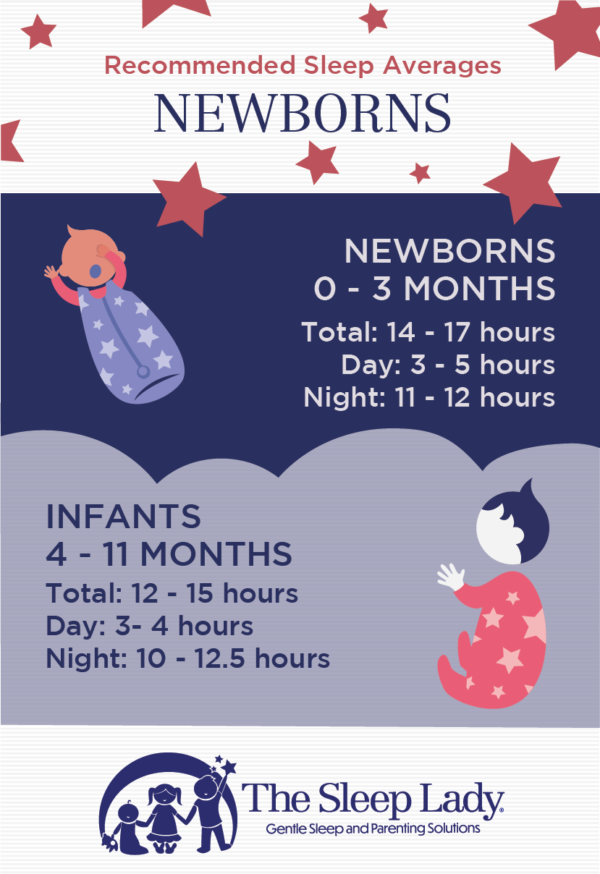How Much Do Newborns Sleep?
Most newborns sleep about 14 to 17 hours in a 24-hour period, sometimes even a little more (6-Hirsh). On average, full-term infants spend around 70% of their time asleep (5-Daphna), and this abundant rest is essential for their rapid growth and development in the first few weeks.
However, newborn sleep happens in short bursts—usually just 2 to 4 hours at a time, both day and night (9-Devnani). This is primarily because their tiny stomachs can only hold a small amount of milk, requiring them to wake frequently to eat before drifting off again.
Every baby is different, so if your newborn sleeps slightly more or less than average, that’s okay! The key is to watch their overall well-being, growth, and feeding patterns rather than expect rigid sleep schedules at this stage.
Week-Specific Sleep Schedules (for First 6 Weeks)
Newborns have rapidly evolving sleep patterns in the first weeks of life. While they still wake frequently, you may notice small changes week by week as their circadian rhythms develop and they gradually consolidate longer sleep stretches.
At this stage, sleep is still unpredictable, and the focus should be on responding to your baby’s needs, rather than following a strict schedule. However, understanding typical newborn sleep patterns can help you anticipate when your baby might be ready for sleep and prevent overtiredness
Week 1: The Fourth Trimester Begins
- Total Sleep: 16–18 hours per day
- Awake Time: 30–45 minutes max
- Naps: 4–6 naps per day, typically 2–4 hours each
- Night Sleep: 2–3-hour stretches, waking for feeds
Newborns in their first week sleep most of the day, with frequent short wake periods for feeding, diaper changes, and brief interactions. Sleep happens around the clock, with no clear distinction between day and night.
Sleep Tip for Week 1:
? Keep nighttime interactions calm and quiet—dim lights, soft voices, and minimal stimulation can help lay the groundwork for longer sleep stretches later.
Week 2: Sleep is Still Frequent but More Alertness Emerges
- Total Sleep: 16–18 hours per day
- Awake Time: 30–45 minutes
- Naps: 4–5 naps per day, still around 2–4 hours each
- Night Sleep: 2–4-hour stretches, waking for feeds
At two weeks, babies are still in the fourth trimester, adjusting to life outside the womb. Some babies may begin to show subtle differences in daytime vs. nighttime sleep, but most still wake every 2–3 hours to feed around the clock.
Sleep Tip for Week 2:
? Try to expose your baby to natural light during the day and keep the room dark at night to begin supporting their internal clock.
Week 4 (1 Month Old): Slightly Longer Stretches Begin
- Total Sleep: 14–17 hours per day (6-Hirsh)
- Awake Time: 45–60 minutes
- Naps: 4–5 naps per day, 1.5–3 hours each
- Night Sleep: 3–5-hour stretches possible
Around 4 weeks old, some babies start to have one slightly longer stretch at night (about 4 hours), though frequent night wakings are still normal. They are also becoming more alert during wake times.
Sleep Tip for Week 4:
? Start observing sleepy cues (yawning, fussiness, eye rubbing) and aim to put your baby down before they become overtired.
Week 6: Night Sleep is Slowly Lengthening
- Total Sleep: 14–17 hours per day
- Awake Time: 45–60 minutes
- Naps: 4 naps per day, 1–3 hours each
- Night Sleep: 3–6-hour stretches may emerge
By six weeks, some babies may begin sleeping one longer stretch of 4–6 hours at night, though many still wake every 3–4 hours to eat. They are also starting to respond more to bedtime routines, making this a great time to introduce gentle, consistent sleep habits.
Sleep Tip for Week 6:
? A simple bedtime routine (feeding, swaddling, soft singing, dim lighting) can help signal that nighttime sleep is different from naps

1-Month-Old Sleep Schedule
By 1 month old, babies typically sleep between 14–17 hours per day (6-Hirsh). Their wake windows remain short (45–60 minutes), and they still need frequent naps throughout the day.
Example Daily Routine (Times will vary based on your baby’s natural rhythm)
- 7:00 AM – Wake & feed
- 8:00 AM – Nap (1–2 hours)
- 10:00 AM – Wake & feed
- 11:00 AM – Nap (1–2 hours)
- 1:00 PM – Wake & feed
- 2:00 PM – Nap (1–2 hours)
- 4:00 PM – Wake & feed
- 5:00 PM – Short nap (30–60 min)
- 6:00 PM – Wake, feed, and quiet activity
- 7:30–9:00 PM – Bedtime routine (feed, dim lights, soothing cues)
- 9:00 PM – Bedtime
- Overnight – 3–5 wakings for feedings, every 3–4 hours
At this stage, babies still wake frequently at night to eat. Some may start to show one slightly longer stretch of 3–5 hours, but most will still wake every few hours.
Sleep Tips for 1 Month Olds:
✔ Follow sleepy cues – Yawning, staring, fussiness, or rubbing eyes signal it’s time for sleep.
✔ Keep wake windows brief – Overtired babies have a harder time settling.
✔ Encourage day/night differentiation – Keep daytime interactions bright and active, and nighttime quiet and dim.
✔ Begin a simple bedtime routine – A feed, swaddle (if using), and low lights can signal nighttime sleep.
2-Month-Old Sleep Schedule
At 2 months, babies are becoming more alert and interactive during their wake periods. They may also start having one longer stretch of night sleep (4–6 hours), though multiple night feedings are still normal.
Example Daily Routine
- 7:00 AM – Wake & feed
- 9:00 AM – Nap (1–2 hours)
- 11:00 AM – Wake & feed, gentle playtime
- 12:30 PM – Nap (1–2 hours)
- 2:30 PM – Wake & feed
- 4:00 PM – Nap (1–2 hours)
- 5:30 PM – Wake & feed
- 6:30 PM – Short catnap (30–45 minutes)
- 7:30–8:00 PM – Wake, quiet activity, bedtime routine
- 8:00–9:00 PM – Bedtime
- Overnight: 2–4 wakings, with one longer 4–6-hour stretch emerging for some babies
Note: Some babies may naturally consolidate bedtime to an earlier window (7:30–8:30 PM) while others continue to have a later bedtime (8:30–9:30 PM).

Sleep Duration by Age
Newborn sleep evolves rapidly in the first few months, with total sleep gradually consolidating into longer night stretches and more predictable naps. While every baby is different, the following sleep guidelines can help parents anticipate typical sleep needs at each stage while remaining flexible to their baby’s cues.
Newborn (0–4 Weeks)
- Total Sleep: 14–17 hours per day (6-Hirsh)
- Naps: 4–6 naps per day, lasting 2–4 hours each
- Night Sleep: 2–3-hour stretches before waking for feeds
Newborns sleep frequently and unpredictably, waking every 2–3 hours to feed. Their circadian rhythms are not yet developed, so sleep happens around the clock with no clear distinction between day and night.
1 Month Old
- Total Sleep: 14–16 hours per day
- Naps: 4–5 naps per day, 1.5–3 hours each
- Night Sleep: 3–5-hour stretches may emerge
By 4–5 weeks, babies start to develop slightly more predictable morning and afternoon rest periods, though frequent night wakings are still normal.
6 Weeks Old
- Total Sleep: 15–16 hours per day
- Naps: 4–5 naps per day, varying from 30 minutes to 2+ hours
- Night Sleep: One longer stretch (4–6 hours) may begin to emerge
At 6 weeks, some babies naturally start sleeping one longer stretch at night (though they will still wake up multiple times to feed). Their awake periods are also lengthening, typically 45–60 minutes at a time.
2 Months Old
- Total Sleep: 15–16 hours per day
- Naps: 4–5 naps per day, 1–2 hours each
- Night Sleep: One longer stretch of 4–6 hours is more common, with 2–3 wakings overnight
By 2 months, babies begin to follow a more structured sleep rhythm, with longer awake periods (60–75 minutes), a more defined nap structure, and gradually lengthening night sleep.

Recognizing Sleep Cues in Newborns
Newborns give small signs when ready to sleep, and spotting these can help you get them down before overtiredness hits. Here’s what to watch for:
- Yawning
- Rubbing eyes or face
- Glazed eyes or staring off
- Fussing or whining
- Slowed movement
- Jerky, uncoordinated movements (a sign of fatigue)
- Clenched fists
Newborns can’t tell us when they’re tired, but they do show subtle sleepy signals before becoming overtired. Learning to spot these early signs can help prevent fussiness and make it easier to settle your baby for sleep.
Does My Baby Need a Sleep Routine?
Yes, a simple routine can be beneficial. While newborns don’t follow strict schedules due to frequent feedings, a consistent routine helps them recognize bedtime cues.
Basic Newborn Sleep Routine:
- Feed First: Make sure your baby is full and comfortable.
- Diaper Change: A fresh diaper reduces the likelihood of waking soon after.
- Quiet Time: Dim lights, keep things calm, and gently cuddle or rock them.
- Swaddle (If They Like It): Swaddling can help your baby feel secure.
- Sing or Read: Soft lullabies or a short story can ease them into sleep.
- Put Them Down Drowsy: Lay your baby down when they’re sleepy but awake to help them start learning to fall asleep on their own.
How to Help Your Newborn Settle into a Sleep Schedule
Newborns don’t follow strict schedules yet, but gentle consistency can help them begin to develop healthy sleep habits over time. While a predictable sleep rhythm typically emerges around 3 to 4 months (11-James), you can support better sleep now with small, age-appropriate steps.
Tips for Encouraging a Gentle Sleep Rhythm
- Follow Your Baby’s Cues – Watch for signs of tiredness like yawning, fussing, or rubbing eyes, and put your baby down before they become overtired.
- Create a Simple Routine – A predictable pre-sleep pattern (feed, diaper change, dim lights, cuddles) helps signal sleep time.
- Distinguish Day and Night – Keep daytime bright and engaging and nights calm and dim to help regulate their internal clock.
- Feed on Demand – Newborns need frequent feedings, and responding to their hunger cues can help them settle into a natural sleep-wake cycle.
- Put Them Down Drowsy but Awake – Studies show this encourages longer, more consolidated nighttime sleep as babies grow (8-Adams). If they’re calm but not fully asleep, try laying them down to help them gradually learn self-settling skills.
- Be Patient and Flexible – A true sleep pattern takes time to develop (11-James). Until then, consistency and responsiveness will help guide your baby toward longer, more restful sleep.
Ideal Bedtime for Different Newborn Ages
Newborns don’t have a set bedtime at first because their circadian rhythms are still developing. Instead of a strict bedtime, it’s best to follow sleepy cues and allow sleep to happen naturally. However, as babies grow, their internal clocks begin to adjust, and bedtime can gradually shift earlier.
Bedtime by Age
- 0–4 Weeks → No set bedtime yet; follow your baby’s natural sleep cues. Most newborns naturally fall asleep between 9 PM – 11 PM.
- 4–6 Weeks → Begin gently shifting bedtime earlier into the 8:30 PM – 10 PM range as babies start staying awake for slightly longer periods.
- 6–8 Weeks → Introduce a more consistent bedtime in the 7:30 PM – 9 PM range, as babies start responding to routines and dim lighting cues.
How to Support a Gentle Bedtime Transition
- Expose your baby to natural light during the day – This helps reinforce day vs. night differences.
- Keep nighttime calm and dim – Lowering lights and reducing stimulation helps cue the body for sleep.
- Establish a simple evening routine – A warm bath, gentle feeding, and quiet time can help wind down for the night.
Tip: Don’t stress about bedtime in the first 6–8 weeks—it’s more important to follow your baby’s cues than to set a fixed time.
Safe Sleep Guidelines for Newborns (American Academy of Pediatrics)
The American Academy of Pediatrics (AAP) provides key recommendations to help keep your newborn safe while sleeping and reduce the risk of Sudden Infant Death Syndrome (SIDS).
AAP-Recommended Safe Sleep Practices
- Back to Sleep – Always place your baby on their back for naps and nighttime sleep.
- Firm, Flat Sleep Surface – Use a firm mattress with a fitted sheet in a crib, bassinet, or play yard—no pillows, blankets, or bumpers.
- Room Share, Don’t Bed Share – Keep your baby’s crib or bassinet in your room for the first 6–12 months, but avoid bed-sharing, as it increases SIDS risk.
- Empty Crib – Keep your baby’s sleep space free of loose blankets, pillows, stuffed animals, or toys.
- Breastfeeding is Protective – If possible, breastfeeding has been shown to lower SIDS risk while also providing important health benefits.
- Pacifiers Can Help – Offering a pacifier at nap time and bedtime may reduce the risk of SIDS. If breastfeeding, wait until it’s well-established (around 3–4 weeks) before introducing one.
- Avoid Overheating – Dress your baby lightly for sleep, and keep the room at a comfortable temperature. Overheating has been linked to higher SIDS risk.
- Smoke-Free, Alcohol-Free Environment – Avoid exposure to cigarette smoke, alcohol, or drugs, as these significantly increase SIDS risk.
- Regular Checkups and Vaccinations – Staying up to date with pediatric visits and vaccinations has been associated with lower sleep-related risks.
Baby Sleep Environment
Creating the ideal sleep environment can help your newborn sleep better and longer. Here’s what to consider:
- White Noise and Blackout Curtains – Some babies sleep better with background noise or a darker room.
- Optimal Room Temperature – Aim for a room between 68–72°F (20–22°C) to avoid overheating (12-Wigfield).
- Clear the Crib – Use a firm mattress and fitted sheet only; soft bedding is linked to increased risks, like SIDS (1-Ashley).
- Smart Bassinets – Devices like the SNOO can offer gentle rocking, white noise, and swaddling, promoting safer, longer sleep (4-Singh).
- Warm Crib – Some parents warm the crib before laying the baby down, but ensure anything warm is removed before placing your baby inside.
Key Elements for a Safe and Soothing Sleep Space
- White Noise and Darkness – Some babies sleep better with gentle background noise and a dark room.
- A white noise machine can muffle household sounds and provide a consistent sleep cue.
- Blackout curtains can help reduce light exposure, especially for daytime naps.
- Optimal Room Temperature – Keep the room at 68–72°F (20–22°C) to avoid overheating, which is linked to SIDS risk (12-Wigfield).
- Dress baby lightly and adjust layers based on room temperature.
- Clear the Crib – Use a firm mattress with a fitted sheet only; avoid blankets, bumpers, or stuffed animals, as soft bedding increases SIDS risk (1-Ashley).
- Smart Bassinets and Soothing Aids – Some parents find that motion bassinets (like the SNOO) help with gentle rocking, white noise, and swaddling, promoting safer, longer sleep (4-Singh).
- Always follow manufacturer safety guidelines and ensure baby is placed on their back for sleep.
- A Warm (But Safe) Sleep Space – Some parents briefly warm the crib before laying baby down (using a warm towel or heating pad for a few minutes), but ensure it’s removed before placing baby inside to avoid overheating.
Introduction to Baby Sleep Coaching
In the first few months, your baby is still developing their sleep patterns, and it’s too early for formal sleep training. However, you can gently support healthy sleep habits by introducing:
- A consistent bedtime routine – Simple cues like dim lights, quiet time, and soothing sounds help your baby recognize when it’s time to sleep.
- Drowsy but awake practice – Laying your baby down calm but not fully asleep can gradually encourage self-soothing over time.
- Gentle settling techniques – Rocking, patting, or shushing can help ease your baby into sleep without creating strong sleep crutches.
Around 3–4 months, babies develop more mature sleep cycles, making it a good time to gently shape independent sleep skills if needed. Until then, focus on responding to your baby’s needs and creating a soothing sleep environment.
Conclusion: Embrace the Newborn Phase
While there isn’t a “one-size-fits-all” newborn sleep schedule, understanding your baby’s sleep needs will help you create a nurturing and predictable rhythm over time. Remember, each baby is unique, so be patient as you both navigate this beautiful journey together.
Citations
- Ashley H. Hirai, Katherine Kortsmit, Lorena Kaplan, Erin Reiney, Lee Warner, Sharyn E. Parks, Maureen Perkins, Marion Koso-Thomas, Denise V. D’Angelo, Carrie K. Shapiro-Mendoza; Prevalence and Factors Associated With Safe Infant Sleep Practices. Pediatrics November 2019; 144 (5): e20191286. 10.1542/peds.2019-1286
- AAP TASK FORCE ON SUDDEN INFANT DEATH SYNDROME. “SIDS and Other Sleep-Related Infant Deaths: Updated 2016 Recommendations for a Safe Infant Sleeping Environment.” Pediatrics, 138 (2016). https://doi.org/10.1542/peds.2016-2938.
- Burnham, M., Goodlin‐Jones, B., Gaylor, E., & Anders, T. (2002). Nighttime sleep-wake patterns and self-soothing from birth to one year of age: a longitudinal intervention study.. Journal of child psychology and psychiatry, and allied disciplines, 43 6, 713-25 . https://doi.org/10.1111/1469-7610.00076.
- Singh, J., & Menahem, S. (2023). The five “S’s” and the “SNOO” Smart Sleeper—non-pharmacological interventions (NPI) to promote sleep and reduce crying of infants: a scoping review. Translational Pediatrics, 12, 1527 – 1539. https://doi.org/10.21037/tp-23-42.
- Daphna Yasova Barbeau et al. “Sleep Disturbances in Newborns.” Children, 4 (2017). https://doi.org/10.3390/children4100090.
- M. Hirshkowitz, M. Hirshkowitz, Kaitlyn Whiton, S. Albert, C. Alessi, O. Bruni, L. Doncarlos, Nancy L Hazen, J. Herman, E. Katz, L. Kheirandish-Gozal, D. Neubauer, A. O’donnell, M. Ohayon, J. Peever, R. Rawding, R. Sachdeva, B. Setters, MICHAEL V. Vitiello, J. Ware and P. Hillard. “National Sleep Foundation’s sleep time duration recommendations: methodology and results summary..” Sleep health, 1 1 (2015): 40-43 . https://doi.org/10.1016/j.sleh.2014.12.010.
- Galland, B., Taylor, B., Elder, D., & Herbison, P. (2012). Normal sleep patterns in infants and children: a systematic review of observational studies.. Sleep medicine reviews, 16 3, 213-22 . https://doi.org/10.1016/j.smrv.2011.06.001.
- Adams, E., Savage, J., Master, L., & Buxton, O. (2020). Time for bed! Earlier sleep onset is associated with longer nighttime sleep duration during infancy.. Sleep medicine, 73, 238-245 . https://doi.org/10.1016/j.sleep.2020.07.003.
- P. Devnani. “Paediatric sleep medicine.” The Indian Journal of Sleep Medicine, 5 (2010): 105-110. https://doi.org/10.5005/IJSM-5-4-105.
- Tomasz Wielek, Renata Del Giudice, Adelheid Lang, Malgorzata Wislowska, Peter Ott and Manuel Schabus. “On the development of sleep states in the first weeks of life.” PLoS ONE (2019). https://doi.org/10.1371/journal.pone.0224521.
- I. St James-Roberts, Marion Roberts, Kimberly Hovish and C. Owen. “Video Evidence That London Infants Can Resettle Themselves Back to Sleep After Waking in the Night, as well as Sleep for Long Periods, by 3 Months of Age.” Journal of Developmental and Behavioral Pediatrics, 36 (2015): 324 – 329. https://doi.org/10.1097/DBP.0000000000000166.
- Wigfield, Ruth E., Peter J. Fleming, Y. E. Azaz, Thelma E. Howell, D. E. Jacobs, Pam S. Nadin, Rosie McCabe, and Alison J. Stewart. “How much wrapping do babies need at night?.” Archives of disease in childhood 69, no. 2 (1993): 181-186.





